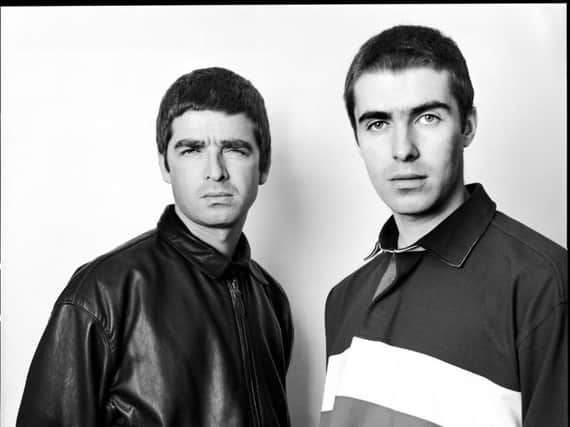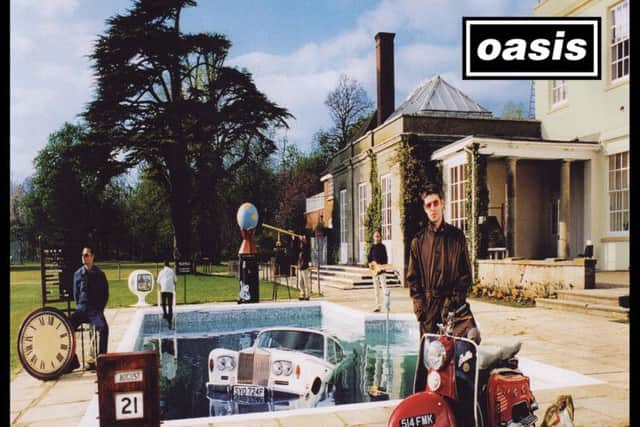Why Be Here Now is the worst essential album ever


If only someone had told them. After all, they weren't short of acolytes, disciples, hangers-on. But to be in Oasis in 1996 was evidently to have the world your way. Just two albums in, they were playing to hundreds of thousands of devotees at some of the biggest rock shows in a generation; you can see why no one dared tell them ‘no’. Still, it's a tragedy for British guitar music that they didn't.
Because the result was Be Here Now, which has now been lavishly reissued, remastered and repackaged, perhaps in hope of a re-evaluation. It has gone down in infamy: few albums have been launched with such hype, listened to with such disappointment and returned to the point of purchase with such relief. No record sold more copies more quickly, and none was disposed of more speedily. It ended the Gallaghers’ claim to the Beatles’ throne, killing with it the hope that the sixties could be relived in the nineties and leaving in its wake the era of Travis and their attendant purveyors of musical drizzle.
Advertisement
Hide AdAdvertisement
Hide AdIt would be uplifting indeed to report that the passage of time has helped the album, that distance from the titanic expectations surrounding its release has shown it to be not that bad after all. But no: all the things about it that were dreadful in 1997 are still dreadful in 2016. Its flaws are legion, but they all result from a chronic lack of intelligence, which is unforgivable given the evident wit of the brothers Gallagher.


It's not one of those enjoyably stupid albums; it's not a whole load of daft fun. No, this is a record seemingly thrown together without any thought, by people convinced they're doing something great. From the banal symbolism of the cover to the emptiness of its contents, Be Here Now has nothing to say and everything to say it with. Cluttered, clumsy, sludgy, lazy, gluttonous, it's self-obsessed and self-important, weighed down at every turn by the primitive belief that more is more.
Musically, Be Here Now is never knowingly underblown. Songs are routinely stretched beyond their natural lifespan, to the extent that they often sound bored with themselves. Noel Gallagher boasted at the time that some songs feature 50 guitar tracks; unfortunately, it sounds like it. Material that could be thrilling and punchy - such as My Big Mouth and I Hope, I Think, I Know - is rendered blobby and flabby. Fade In-Out starts promisingly mysterious and atmospheric before succumbing to the album's washy malaise. Stand By Me could be a majestic anthem but it's smothered and suffocated by strings and guitars and guitars and guitars and more strings. In an alternative universe, All Around The World is a well-crafted, melodically pleasing spirit-lifter; but sadly we are in this universe, and it's none of those things, instead falling victim to its thirst for all things epic. Such is the vanity on show that it even gets a reprise, as if it's Sgt Pepper or something.
Then we have the 'lyrics'. To call them nonsense would be to insult Edward Lear; to call them doggerel would be to insult Pam Ayres. They're not even vacuous; they are themselves a vacuum, sucking out anything of worth in the melodies. You can take your pick of any lines from any song, so let's go with the first verse of the title track: "Wash your face in the morning sun/Flash your pan at the song that I'm singing/Touchdown bass living on the run/Make no sweat at the hole that you're digging." They're either the first words that came into Noel's head, or they're not; either way, it's pretty damning.
Advertisement
Hide AdAdvertisement
Hide AdIt goes on and on, for 71 minutes. You think it's going to finish, and then it doesn't. You think again that it's going to finish, and then it doesn't. In the time it takes to get through Be Here Now, you can listen to Revolver twice. Oasis, so in hock to the Beatles, evidently learned nothing from them, and on this evidence it's astonishing to think that they were ever seriously compared. The reissue comes with a couple of extra discs, including B-sides and hitherto unreleased demos; but any hope that latter might present the album in a much-needed stripped-down form are swiftly abandoned, the recordings sounding depressingly similar to the album tracks but with worse singing.


And yet, the strangest thing: no record collection is complete without Be Here Now. It may be mostly rotten, but it's also essential. Anyone who aspires to understand British pop culture needs to get their head around it, because it's undoubtedly a landmark album. The release of no British record since has been met with anything like the same fervour. No British rock'n'roll band has since topped the year's album charts. Since Be Here Now, there have been some important albums by British guitar bands, and some massive-selling albums by British guitar bands, but none that has been both. Its record for first-week sales lasted until last year, when it was broken by Adele. It brought down the curtain on Britpop and ended the days of the swaggering working-class tabloid-filling rock star. Be Here Now is the last artefact from an era when guitar music mattered to those outside its usual constituency, when everyone was expected to have an opinion about it, when it was still somehow vital.
And it has its moments. There's a point in Do You Know What I Mean, its opening song, when we get a glimpse of what the album could have been, when the music and words coalesce with towering power and cocky grandeur: "I met my maker, I made him cry." For much of their debut and some of their second album, Oasis had shown serious talent, with hunger, excitement and attitude to match. If only someone had told them to rein themselves in. If only someone had told them to focus, to apply themselves, to be disciplined, to ally craft with their ambition; if only they'd have listened. Then Be Here Now might just have been the album we hoped it would be, there, then.
* Be Here Now: Chasing the Sun Edition is released on October 7 on Big Brother Recordings